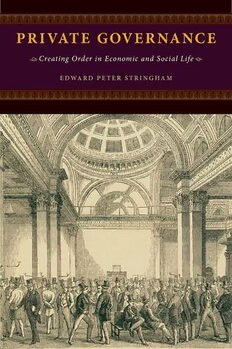Table Of ContentPrivate Governance
Private Governance
Creating Order in Economic
and Social Life
• •
•
Edward Peter Stringham
1
1
Oxford University Press is a department of the University of Oxford.
It furthers the University’s objective of excellence in research, scholarship,
and education by publishing worldwide.
Oxford New York
Auckland Cape Town Dar es Salaam Hong Kong Karachi
Kuala Lumpur Madrid Melbourne Mexico City Nairobi
New Delhi Shanghai Taipei Toronto
With offices in
Argentina Austria Brazil Chile Czech Republic France Greece
Guatemala Hungary Italy Japan Poland Portugal Singapore
South Korea Switzerland Thailand Turkey Ukraine Vietnam
Oxford is a registered trade mark of Oxford University Press
in the UK and certain other countries.
Published in the United States of America by
Oxford University Press
198 Madison Avenue, New York, NY 10016
© Oxford University Press 2015
All rights reserved. No part of this publication may be reproduced, stored
in a retrieval system, or transmitted, in any form or by any means, without the
prior permission in writing of Oxford University Press, or as expressly permitted
by law, by license, or under terms agreed with the appropriate reproduction
rights organization. Inquiries concerning reproduction outside the scope of the
above should be sent to the Rights Department, Oxford University Press, at the
address above.
You must not circulate this work in any other form
and you must impose this same condition on any acquirer.
Cataloging-in-Publication Data is on file with the Library of Congress.
9780199365166
1 3 5 7 9 8 6 4 2
Printed in the United States of America on acid-free paper
To legal centralists of all parties.
CONTENTS
Foreword by Peter Boettke ix
PART ONE: Why Private Governance?
1. Introduction 3
2. Beyond the Deus ex Machina Theory of Law 9
3. Rules from Voluntary Associations as an Alternative to Coercive Ones:
Governance as a Club Good 21
PART TWO: Privately Governed Markets in History and Modern Times
4. Markets without Enforcement: Reciprocity and Reputation Mechanisms
in the World’s First Stock Market 39
5. The Evolution of Rules in Exclusive Clubs: From Coffeehouses to the
London Stock Exchange 61
6. Markets Creating Transparency: Competing Listing and Disclosure
Requirements from the Big Board in New York to the Alternative
Investment Market in London 79
7. How Technologically Advanced Markets Can Work Even When
Fraud Is “Legal”: Ex Ante Risk Management by PayPal and Other
Intermediaries 100
8. Bundling Private Governance with Bricks and Mortar: Private Policing
in California, North Carolina, and Beyond 113
9. The Most Personal Form of Private Governance: Individual
Self-Governance 134
10. When Third-Party Review Is “Necessary”: Adjudication by
Contract 148
11. Does Private Governance Work in the Most Complex Markets?
Successful Risk Management on Wall Street Even in the Wake
of the 2008 Economic Downturn 165
PART THREE: Lessons of Private Governance
12. The Relationship between Public and Private Governance: Does
the State Help or Crowd Out Good Governance? 193
( vii )
( viii ) Contents
13. Applying Hayek’s Insights about Discovery and Spontaneous Order
to Governance 206
14. The Unseen Beauty that Underpins Markets 226
Acknowledgments 237
References 239
Index 269
FOREWORD
Edward Peter Stringham’s Private Governance: Creating Order in Economic and
Social Life is wonderfully written and chock full of compelling case studies of
precisely how individuals and communities achieve governance without turn-
ing to government. Stringham provides examples that cross time and cul-
tures, from the origins of financial markets to the complicated transactions
that define our modern global economy.
Traditional political economists believe that without a strong state author-
ity, private actors will prey upon those weaker than themselves. In so doing,
traditional political economists commit errors of both overpessimism and
overoptimism. The standard analysis is overly pessimistic about the ability
of individuals and communities to find rules that enable them to live better
together and to realize the social gains from cooperation rather than devolve
into social conflict without the establishment of a coercive state authority.
But the standard analysis is also overly optimistic about the state’s ability to
establish binding constraints on itself so that societies are not just trading off
the threat of private predation for public predation.
History is filled with examples of aggressive and oppressive public preda-
tion, so this intellectual error of overoptimism is one of the most costly ever
committed. The committing of that error was made possible, though, because
of the first error, overpessimism, which hides from view, as Stringham puts it,
“the unseen beauty that underpins markets.” It is in correcting that error that
Stringham’s major contribution resides.
Building on the insights of James Buchanan and his “Economic Theory
of Clubs,” Stringham demonstrates in ways beyond the theoretical imagina-
tion of even Buchanan how far one can stretch the basic argument for pri-
vate governance. But theoretical imagining, let alone normative pontificating,
is not what Stringham is content to do. Instead, he demonstrates in one ex-
ample after another that individuals are able to come together, devise rules,
and agree to mechanisms of enforcement in ways that transform situations
of potential conflict into opportunities of mutually beneficial and reinforcing
cooperation.
His narrative introduces the reader to something that is absolutely beauti-
ful: the amazing capacity of diverse individuals to realize peaceful cooperation
( ix )

